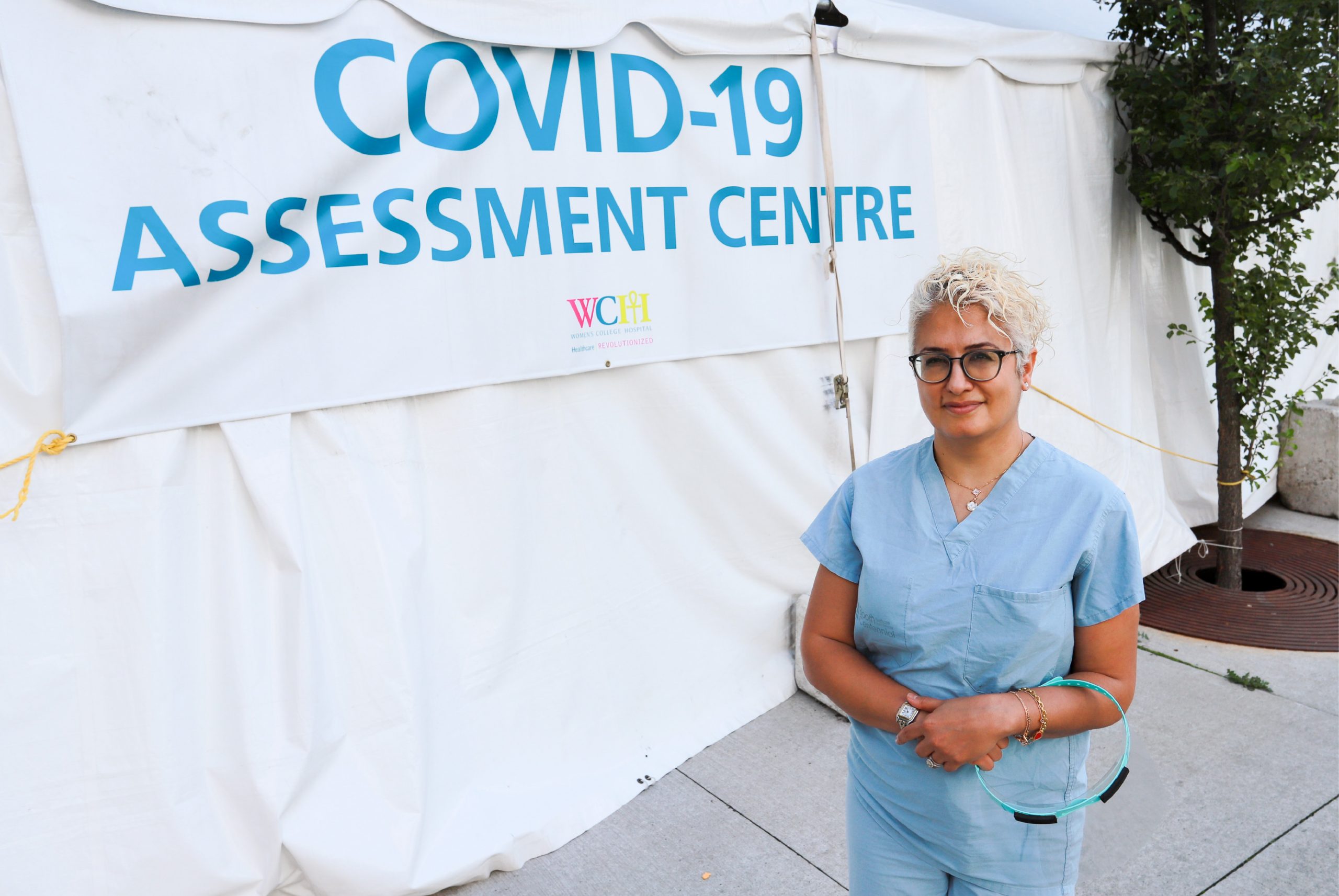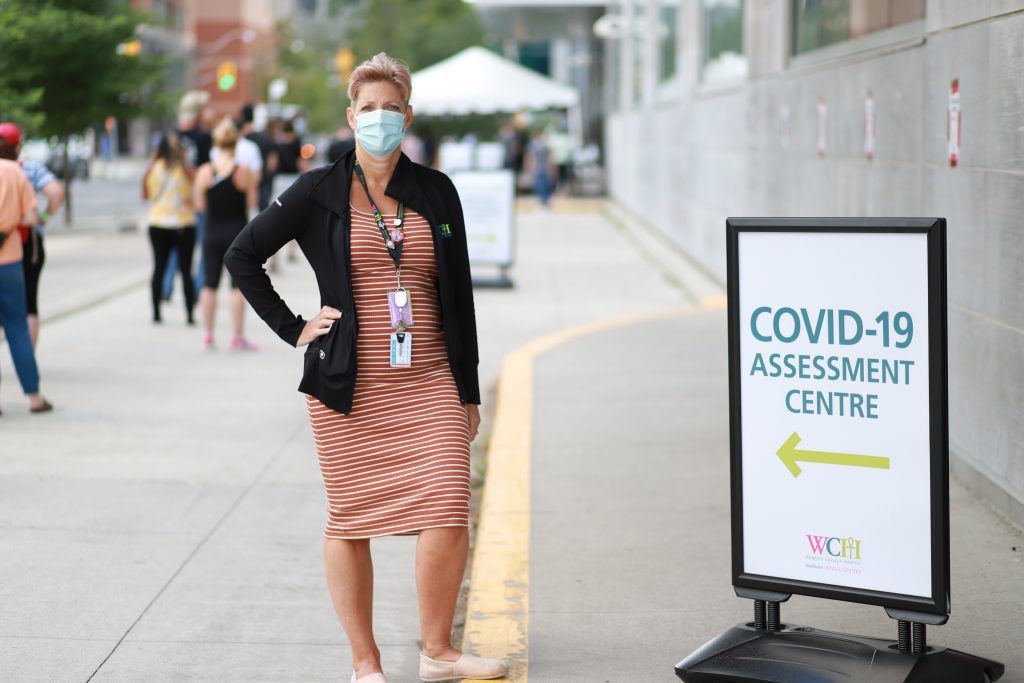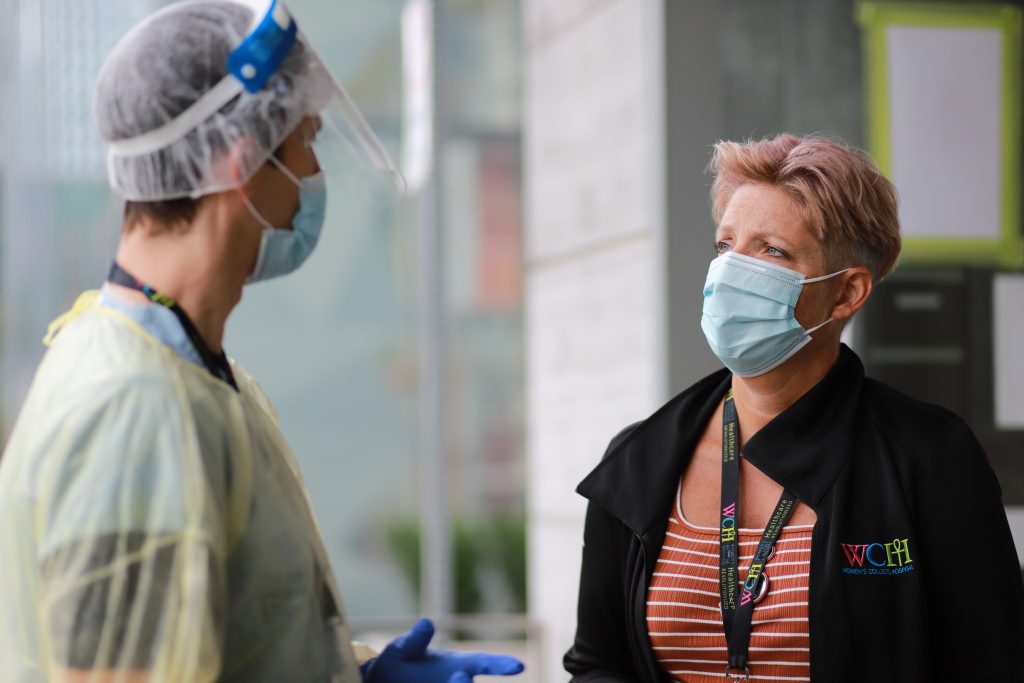

Mobilizing to provide COVID-19 testing where it’s needed most
Dr. Sheila Riazi’s alarm goes off at 5 a.m. every morning, and a little over an hour later she is walking through the doors of Women’s College Hospital (WCH). Since the beginning of March, Dr. Riazi has acted as the medical director of WCH’s bustling COVID-19 Assessment Centre, which services an average of more than 800 patients per day.
When Canada’s first presumptive COVID-19 cases began appearing, hospitals across the country mobilized as the first line of defense in identifying new cases and preventing further spread of the virus. By mid-March, WCH was opening the first COVID-19 Assessment Centre in downtown Toronto.
“We had a lot of stuff to do and we didn’t have much time,” recalled Dr. Riazi. “We had a week to open the Centre – but on the Friday before we were supposed to open, the Ministry of Health approached us and said, ‘There’s no testing centre open in the downtown area this weekend, so can you open up tomorrow?’”
In less than 24 hours, teams from across the hospital had pulled together to get the new Centre off the ground two days ahead of schedule.
Open seven days a week, WCH’s COVID-19 Assessment Centre can be accessed in two ways – as a walk-in patient or through the hospital’s pre-registration call centre. Unique to WCH, the pre-registration system allows patients go online to sign up for a phone consultation with a WCH physician, who provides an assessment and pre-registers the patient for testing. By completing registration at home, the time it takes for a patient to complete their COVID-19 test in hospital is reduced from an average of 15 minutes to under five minutes.
Partially due to the pre-registration system, WCH’s Centre has earned a reputation for its quick, safe and smooth handling of high test volumes – to the point where the Centre began to see returning patients as regular testing became mandatory for some to return to their jobs or visit loved ones in long-term care.
“It’s a team effort,” said Jacqueline Follis, an advanced nurse practitioner and interim clinical manager of the COVID-19 Assessment Centre. “From the security staff and navigators to physicians, nurses and cleaning staff – we’re all working together to make sure things run smoothly.”

But for some patients, an extra level of care is required. “Soon after opening, we identified that many people coming in could benefit from social work facilitation,” continued Follis. “Those experiencing homelessness, as well as underhoused folks and individuals in congregate living situations, had no access to spaces where they could safely self-isolate while awaiting their test results.”
Working with WCH’s Acute Ambulatory Care Unit (AACU), these patients were provided rooms where clinicians could monitor their care while awaiting their COVID-19 test results. A team of WCH social workers and psychotherapists also worked closely with the patients and community partners, shelters and Inner City Health Associates to locate community accommodation that met their patients’ needs, regardless of their COVID status.
However, as the pandemic continued to evolve, it became apparent that coming into the Centre for testing wasn’t possible for some of the city’s most at-risk populations.
In April, long-term care (LTC) homes began experiencing severe outbreaks among staff and residents, who are particularly vulnerable to the illness. There was a critical need for widespread testing that, logistically, couldn’t be performed at the hospital.
“Our mobile COVID-19 assessment team was set up in half a day,” described Dr. Riazi. “On Good Friday, we had the meeting with senior leadership at 9 a.m. and by 5 p.m., everything was ready.”
That first weekend, more than 300 tests were administered for residents and staff at the Kensington Gardens and Mon Sheong LTC homes. Over the course of the next four months, more requests for mobile testing poured in from LTC homes, shelters and congregate living facilities. Working with the Toronto region of Ontario Health, a coordinated approach was established among Toronto hospitals to ensure different regions in the city received timely access to testing support. WCH also learned that, for optimal outcomes, follow-up support was critical for facilities after the mobile team’s visit. The hospital established a Community Support Squad (CSS) to provide ongoing COVID-19 education, assistance with infection prevention and control, as well as advice on staffing challenges.
“I think what is most important is not how many people we tested but who we tested.”
“Our mobile team visited one facility where nearly 25% of the population tested positive – that’s a high rate of infection,” described Dr. Riazi. “Our CSS team went in to assist with layout and infection prevention. When we went back for follow-up testing a few weeks later, there were no cases.”
Since April, the mobile assessment teams have conducted 5,150 tests at 40 sites, including long-term care facilities, shelters, as well as Indigenous health organizations in partnership with WCH’s Centre for Wise Practices. Looking forward, building capacity within the community to conduct testing and prevent spread of the virus is a priority for WCH and its partner organizations.
“We are transitioning to more of a support role as our partners at Parkdale Queen West Community Health Centre and Centre for Addiction and Mental Health (CAMH) take the lead on community testing,” said Follis, noting that WCH is ready to adapt to provide support as needed as the pandemic continues to evolve.

Dr. Riazi has since returned to her role as a staff anesthesiologist and her last day as medical director of the COVID-19 Assessment Centre was on August 31. Reflecting on everything that has been accomplished by the WCH team over the course of the pandemic, she said:
“Working together with our community partners, we covered large areas of Toronto and have always had high volumes of testing at our Assessment Centre. But I think what is most important is not how many people we tested but who we tested. Women’s College Hospital is a champion of health equity, we want to ensure patients who face the most barriers have access to the care they need. There’s so much to be proud of, but what stands out to me is the culturally safe and compassionate care that our teams deliver every single day.”